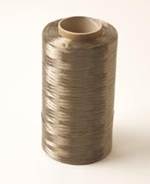Mafic, The Materials Group partner to increase basalt fiber in thermoplastics
The alliance emphasizes basalt fibers’ capabilities as a replacement for existing filled materials and target structural automotive applications.

Photo Credit: Mafic USA
Mafic USA (Shelby, N.C., U.S.) and thermoplastic manufacturer, (TMG; Rockford, Mich., U.S.), announced on August 26 an alliance to increase the use of basalt fiber compounded into injection molded thermoplastics within the automotive industry. Between Mafic’s recent operations at its basalt fiber production facility in Shelby, N.C., and TMG’s work with automotive OEMS and their Tier manufacturing suppliers, the combined expertise will further the overall goal to promote basalt fiber’s good mechanical properties.
A drawn continuous fiber similar to carbon, glass and aramid fibers, basalt fibers both chopped and continuous, are said to provide superior mechanical properties compared to glass fiber for injection molded thermoplastics used in a variety of auto parts. More specifically, note the companies, it offers improved tensile, flexural and impact properties compared to current materials used. In addition, the fiber is said to offer a clear value proposition in nylon resins as a replacement for existing filled materials and can be blended with other fibers.
Moreover, basalt fiber-filled thermoplastics are said to attain an effective balance between cost, performance and sustainability; basalt is said to be more sustainable filler than glass fiber, yielding a 50% reduction in emissions output during manufacturing of the fiber. According to Mafic and TMG, this could eventually lead toward achieving cost, weight and sustainability targets.
Related Content
-
Composites end markets: Sports and recreation (2025)
The use of composite materials in high-performance sporting goods continues to grow, with new advancements including thermoplastic and sustainability-focused materials and automated processes.
-
European boatbuilders lead quest to build recyclable composite boats
Marine industry constituents are looking to take composite use one step further with the production of tough and recyclable recreational boats. Some are using new infusible thermoplastic resins.
-
Evolving natural fiber technology to meet industry sustainability needs
From flax fiber composite boats to RV exterior panels to a circularity model with partnerships in various end markets, Greenboats strives toward its biomaterials and sustainable composites vision in an ever-changing market.



